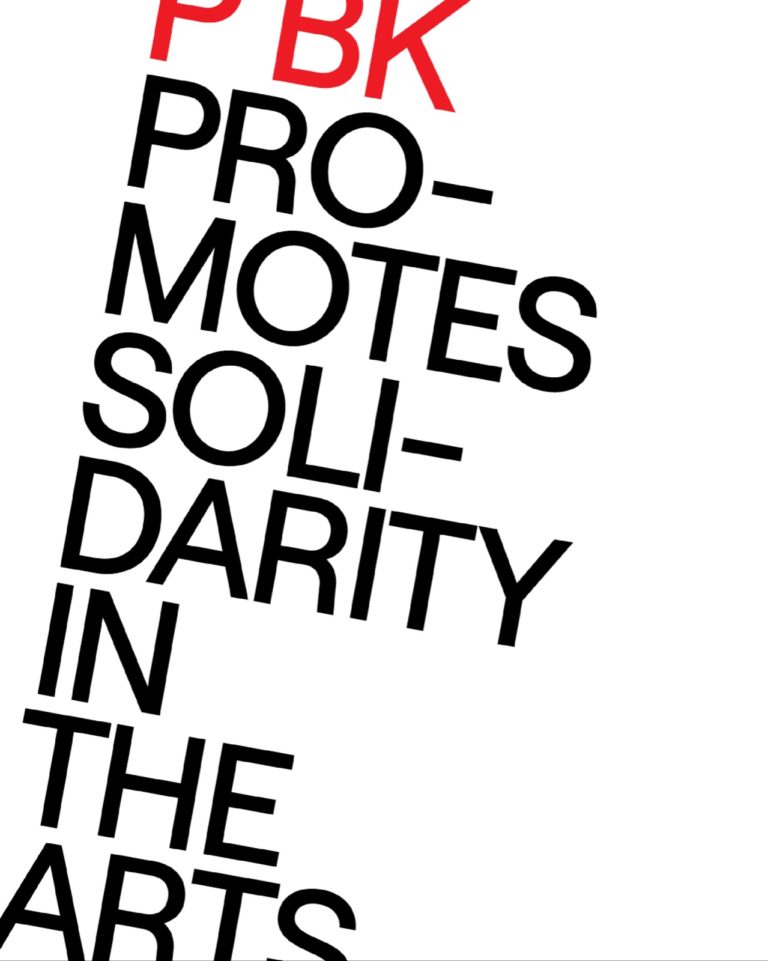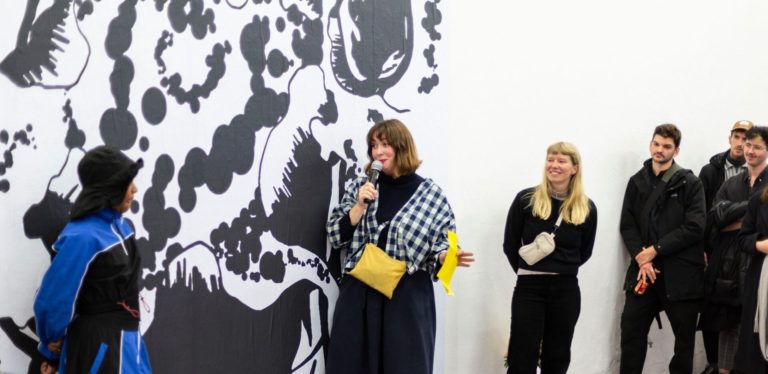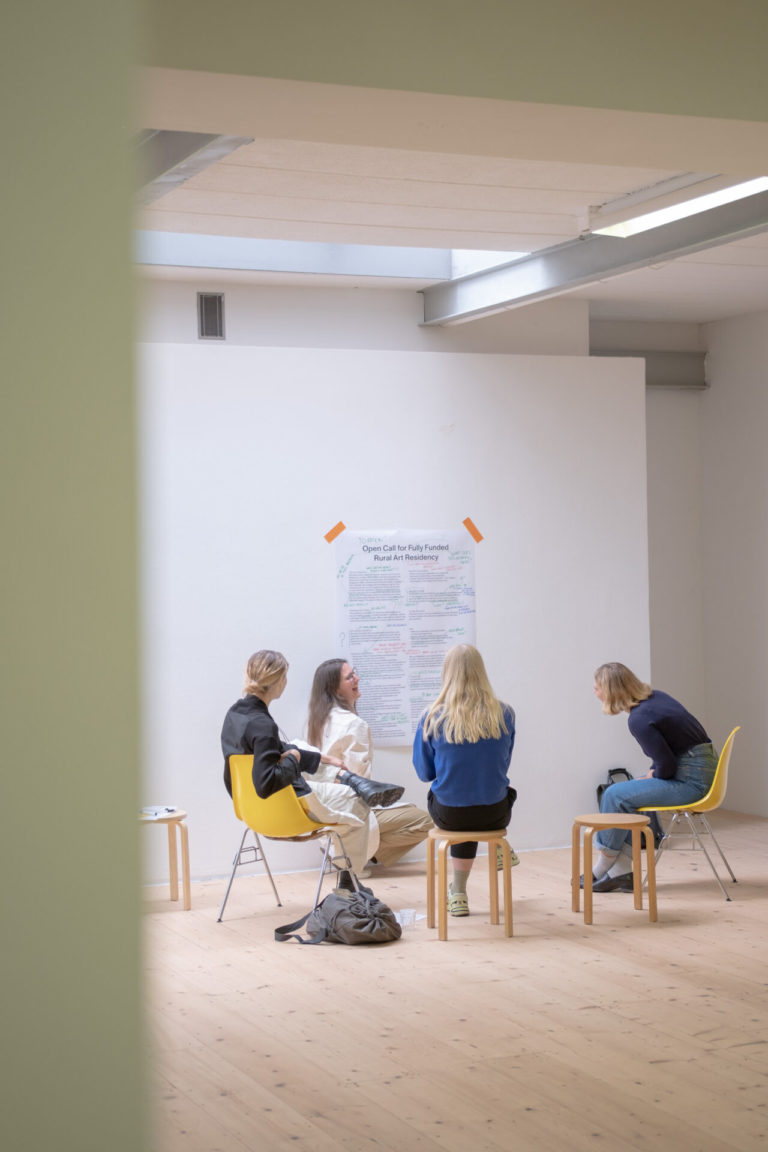Interview 3 of the series: Art at Work
Author: Danai Giannoglou
Platform BK is an association founded in response to the severe budget cuts that were imposed on the cultural sector in the Netherlands in 2012. It now has a long history of campaigning for the rights and working conditions of visual arts professionals. Harriet Rose Morley and Jeannette Slütter, who have been co-directors since 2023, talk about research as methodology, the multicultural context of the Netherlands, and the importance of having practical resources available when it comes to lobbying and activism.

Platform BK Poster – © Nuno Beijinho
Danai Giannoglou: Platform BK has been in existence for more than 12 years. What needs led to its creation, and how has its role and motivation changed over the years?
Harriet Rose Morley: Platform BK was founded in 2012 by a group of visual artists, in reaction to and during the severe budget cuts that affected the cultural sector in the Netherlands. It was founded after the protests that brought the group together, which formalised the organisation. Initially, Platform BK relied entirely on voluntary work. From the beginning, its motivation was to give a voice to visual artists and all those working in the field of visual arts.
Jeannette Slütter: The organisation’s first activity was a lecture after which the group immediately started to build a membership base. Questions of ‘how to unionise’ were at the core of these first steps, as well as the idea of the collective rather than the individual, the collective working body rather than the individual worker–this is perhaps what still distinguishes us from more classical unions. In the beginning, Platform BK received a subsidy in order to set up its foundations, but beyond that it’s safe to say that we have always been an independent organisation that relies on its members.
HRM: Platform BK’s original motivation, which hasn’t changed to this day, is to react to the urgencies. Of course, the leadership of the organisation has changed and taken different forms over the years. In its early stages, the platform was completely self-organised, it later moved to a more formal structure, with a board, a director, and an administrator. Lately, we are delving into co-directorship, which we feel more appropriate for the kind of work that Platform BK does. It is still a fairly new idea, and it was formed in discussion with the board, which is made up of people with different expertise.
JS: But even though it is just the two of us in the office, we also have a very committed and supportive board, as well as a wider support system. People are very connected to Platform BK and they often contribute with their knowledge, networks, and expertise. So we really become an umbrella of collaboration for people and organisations.
HRM: That means we don’t have all the answers, but we know people who do. If we cannot help you directly, we can point you in the direction of someone who can.

Harriet Rose Morley and Jeannette Slüter at the opening of Farida Sedoc’s exhibition ‘People’s Forum’ at W139 – © Elodie Vreeburg
You write that your work focuses on “research, activism, and lobby.” Could you say a few words about each one of these directions and how they might complement each other?
JS: When it comes to research, we do it in two ways: On the one hand, there is the large-scale research that we often conduct in collaboration with larger organisations, as it is difficult to finance on our own, and on the other hand, there is the small-scale research that individual members of Platform BK want to do, which we then platform in the form of online publications. The result of the various researches is our base when it comes to lobbying and it often becomes a reference point for the lobbying of other organisations. In this sense, research and lobbying really go hand in hand.
A great example, and one of the most important ones in terms of Platform BK’s work, is the creation of Kunstenaars Honorarium, a calculation model for minimum remuneration for artists that has been in place since 2017. It’s an exemplary case of how dedicated research led to strong lobbying and ultimately to policy change. For the Kunstenaars Honorarium, Platform BK partnered up with other organisations, such as the Association of Galleries, the Association of Museums, and several other artists’ associations and unions, and received support from the Mondriaan Fund. It was a very long process, which initially led to data-based research, because the people and organisations involved needed to know what they were talking about and who they were representing. In the beginning it looked like a utopian tool, people couldn’t see the end of it and it didn’t seem possible that professionals would actually get paid–which in the Dutch context I would find ridiculous to think about now.
HRM: But all the activities we do–workshops, events, texts, public moments–are research per se and it contribute to a larger pool. We listen to our members and their needs. Our research is bottom-up and this informs the lobbying we do with other organisations. The two feed into each other.
We know that lobbying in itself can sound abstract, and it sounded abstract to us, but in the end, we realised that lobbying is saying “there is a need for this.” So in a sense the members lobby us and we lobby our networks. It helps that we are a more established organisation, continuity is important.
JS: And last but not least, between research and lobbying is activism. Activism is the core of things, it’s the beginning of saying something.

During the event 'A Call to Open Calls', organised by Stroom Den Haag and Platform BK – © Chun Yao Lin
One of your goals, as stated on your website, is to “improve the working conditions of artists and cultural workers with a non-Dutch background.” What does this mean in relation to the Dutch context?
HRM: We believe that there is no need to polarise. Non-Dutch people and Dutch people often have the same difficulties, the same problems. We represent the international, mixed context of the Dutch cultural field and it is important to recognise that. The bureaucratic structures are very difficult to navigate. There is a need to have resources and communities available to disseminate ways of dealing with these problems. Of course, non-Dutch students and people working in the cultural sector face different issues than Dutch professionals, such as struggling with residence permits or feeling extremely let down by support systems or the lack of support systems and institutions before, during, and after the pandemic. But it’s not even about the issues that divide us, it is about the issues that we have in common, that we all face, all these different levels of precarity.
JS: And it is also about making people feel welcome and not excluding anyone who might need our support or who might contribute to our efforts. This is also why we try to translate a lot of documents to make them, and therefore us, more accessible.
HRS: The other thing is that we learn a lot from other contexts and international organisations. Everybody is working on the same problems, so we don’t have to reinvent the wheel.
What is the role of the publishing platform within the organisation?
HRM: Publishing has been a part of Platform BK throughout its existence. The tool of writing is ingrained in the way we work. Platform BK commissions texts, but Jeannette and I don’t identify as writers, so it has been interesting for us to understand how to use this tool in the most effective way. We’ve had very powerful texts throughout Platform BK’s history and many of them are often referenced. The publishing platform is a way for people to see their issues reflected in Platform BK’s priorities. The text is also a way for certain reflections to live on beyond the limits of a one-off event or meeting. We often commission texts that function as reports on the events we are organise, so that people can access them in the future. We prevent gatekeeping, we want to share any knowledge or resources that come together through our platform. We use text and publishing in order to continue the conversation.
How do you see Platform BK’s future?
HRM: It’s a tough question because we are very much in it. The future for us is about maintaining this platform.
JS: It’s also important for us to maintain the grassroots attitude and way of working, while creating a more sustainable working environment. It is a balance that is not obvious. How do you bridge these things? The visual arts sector is not connected enough, so on the one hand we need more members to have a stronger presence, but on the other hand how do we avoid becoming this really big organisation that constantly needs to grow?
HRM: We also want people to understand that they can get involved in Platform BK on many different levels and in many different ways. We have a programme and a direction, but this direction is very much influenced by our members and non-members and their concerns. Yes, Jeannette and I are the faces of the organisation at the moment, but there are many others who work in and around Platform BK and contribute to the wider support system and family. There is no point in gatekeeping anything, as an organisation we do not stand for the individual, we stand for the collective.
Published on June 20th, 2024
About the author:
Danai Giannoglou is a curator, writer and editor currently living and working independently between Athens and Amsterdam. Danai is the co-founder and curator of Enterprise Projects, a project space in Athens that has been functioning independently and periodically since September 2015, as well as the editor of Enterprise Projects Journal, a publishing initiative by Enterprise Projects in the form of a bilingual online publication of newly commissioned theoretical and research essays.